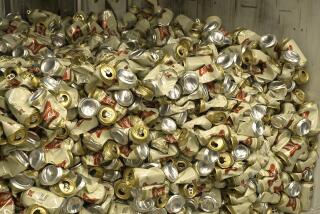Heineken Celebrates 125 Years of Tradition
AMSTERDAM, Netherlands — At an old brewery on the outskirts of Amsterdam, they’re raising frosty mugs to portraits of three generations of Heinekens to toast the beer’s 125th anniversary.
But if Freddy Heineken had founded the label instead of his grandfather, the Dutch might not be celebrating at all.
“If I could do it all over again, I wouldn’t do it in the Netherlands,” the beer baron said, citing high taxes as the reason he would abandon the country that has become associated with the Heineken brand.
But the history isn’t his. It belongs to his grandfather, Gerard Adriaan Heineken, who as a young man in the 1860s bought an Amsterdam brewery called the Haystack.
At first just another newcomer to a crowded European beer market that dates to the 1500s, the company kept expanding and first brewed beer under the Heineken brand name in 1873.
Heineken decided to market the family recipe outside of the Netherlands, and today Heineken NV is the world’s second-largest brewer after U.S.-based Anheuser-Busch.
“A hundred years ago there were about 300 beer brewers in the Netherlands, all of them provincial people. They just couldn’t think big,” Freddy Heineken said. “We hit it big all over the world. We had to--the Netherlands simply was too small.”
Exporting proved to be big business for Heineken, which produces more than 26.4 million gallons annually and ships its trademark green bottles and cans to 170 countries. Heineken also owns its former Dutch competitor, Amstel, and has investments in more than 100 other breweries worldwide.
Gerard Adriaan Heineken was succeeded by his son, Henry Pierre, who then passed the chairmanship on to his son, Freddy. The current chairman, Karel Vuursteen, is not a member of the Heineken family, although Freddy Heineken remains the majority shareholder of the public company.
Despite Heineken’s grumbling about Dutch corporate tax rates, which can exceed 60%, the company’s profit picture is as bubbly as its beer.
In September, Heineken reported a net profit of $163 million for the first half of 1997--up nearly 10% from a year earlier--and sales of $3.26 billion.
But expansion and success have brought some risks.
About 5,700 of Heineken’s 31,000 employees worldwide are in Africa, where business can be both difficult and dangerous. Recently, Hutu rebels massacred more than 30 Heineken employees on a bus as they headed to work at a brewery in troubled Rwanda.
In 1983, Freddy Heineken and his chauffeur were kidnapped outside his Amsterdam office and held for three weeks until the Heineken family paid a ransom of $11.6 million. The men were returned unharmed, chained to a dockside warehouse. Five men were arrested and convicted, and authorities recovered most of the money.
Expansion also has meant dealing with global politics. A venture into Burma was short-lived because of protests over that country’s human rights violations. And the financial crisis in Asia will affect the bottom line for at least the next few years.
Despite the problems, Heineken plans to continue expanding into Asia, Africa and the Middle East, where beer consumption is expected to double, said Margritha Meijer, spokeswoman for Heineken International. In Europe, by contrast, the beer market is flat.
As Heineken goes even more global, it’s trying not to tamper with its Dutch traditions or its trademark pilsener taste.
Even as U.S. microbreweries gain market share by making special brews trendy, Heineken is keeping its recipe consistent and still boosting exports to the United States, where it carved a niche after Prohibition.
“Microbreweries haven’t hurt us,” Vuursteen said. “On the contrary, they have caused a revival of the product. People now talk about beer like they do about wine.”
More to Read
Sign up for The Wild
We’ll help you find the best places to hike, bike and run, as well as the perfect silent spots for meditation and yoga.
You may occasionally receive promotional content from the Los Angeles Times.




